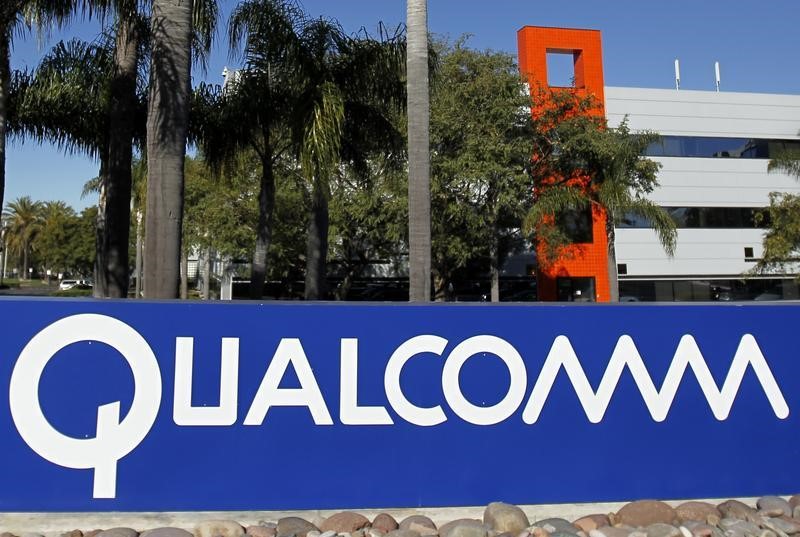By Tom Hals
WILMINGTON, Delaware (Reuters) -Qualcomm’s core processors are properly licensed under an agreement with Arm Holdings (NASDAQ:), a jury ruled in a trial in U.S. federal court that removed some, but not all, of the uncertainty surrounding the mobile chip maker’s expansion into the laptop market.
A week of arguments and deliberations in court ended in a mistrial after the jury failed to resolve one of the three questions presented to it in the trial between the two chip giants. Qualcomm (NASDAQ:) said the result affirmed its right to innovate, but Arm vowed to seek a new trial.
Shares of Arm fell 1.8% in extended trading after the news, and shares of Qualcomm rose 1.8%.
The outcome means the case could be retried in the future – something Arm promised to pursue in a statement after the verdict. Judge Maryellen Noreika, who presided over the case in U.S. federal court in Delaware, encouraged Arm and Qualcomm to mediate their dispute.
“I don’t think either side has achieved a clear victory, or would have achieved a clear victory if this case were retried,” Noreika told the parties.
After more than nine hours of deliberation over two days, the eight-member jury was unable to reach a unanimous verdict on whether startup Nuvia violated the terms of its license with Arm.
But the jury found that Qualcomm – which bought Nuvia for $1.4 billion in 2021 – did not violate that license.
The jury also found that Qualcomm’s chips, made using Nuvia technology and crucial to Qualcomm’s entry into the PC market, were properly licensed under its own agreement with Arm, paving the way for Qualcomm to continue using them to sell.
“The jury vindicated Qualcomm’s right to innovate and confirmed that all Qualcomm products at issue in the case are protected by Qualcomm’s contract with Arm,” Qualcomm said in a statement.
A spokesperson for Arm said the company was “disappointed” that the jury failed to “reach consensus” on the company’s claims and said the goal from the beginning was to protect the company’s intellectual property.
For now, the outcome clears the way for Qualcomm to continue pushing what it calls the “AI PC” in laptop chips aimed at handling tasks like chatbots and image generators. That’s a market where Nvidia (NASDAQ:), Advanced Micro Devices (NASDAQ:) and MediaTek also want to make Arm-based processors.
“My biggest concern was what would happen to the future roadmap if they (Qualcomm) no longer had access to Nuvia cores,” said Bernstein analyst Stacy Rasgon. “Right now, that risk is a lot closer to disappearing from the table.”
The dispute between Arm and Qualcomm focused on the royalty rate Qualcomm would have to pay for each chip. Nuvia was said to be paying higher rates than Qualcomm before Qualcomm bought the startup company and wove its technology into chips under its own license with Arm at lower royalty rates.
Ben Bajarin, CEO of technology consultancy Creative Strategies, said Arm’s current growth forecasts are not dependent on achieving higher tariffs from Qualcomm as Arm chips enter the PC market.
“They didn’t take a win into account through their quarterly (earnings) calls,” Bajarin said. “So none of this changes their economic advantage. It’s really just a matter of contractual arguments.”
However, the outcome of the trial leaves open the question of where Arm’s technology begins and ends. Arm licenses its computer architecture to companies, but also sells computer core designs as off-the-shelf products.

Some of Arm’s more advanced customers, such as Apple (NASDAQ:), Qualcomm and Nuvia, license Arm’s architectures but develop their own custom cores. At trial this week, Arm’s lawyers emphasized that the license terms for architecture with Nuvia gave the company the right to demand the destruction of Nuvia’s custom core designs.
“This has implications for the entire industry,” Jim McGregor of Tirias Research said in an interview. “Whether you use a standard Arm core or develop your own Arm core, it has been the rock of everything from electric toothbrushes to satellites.”


